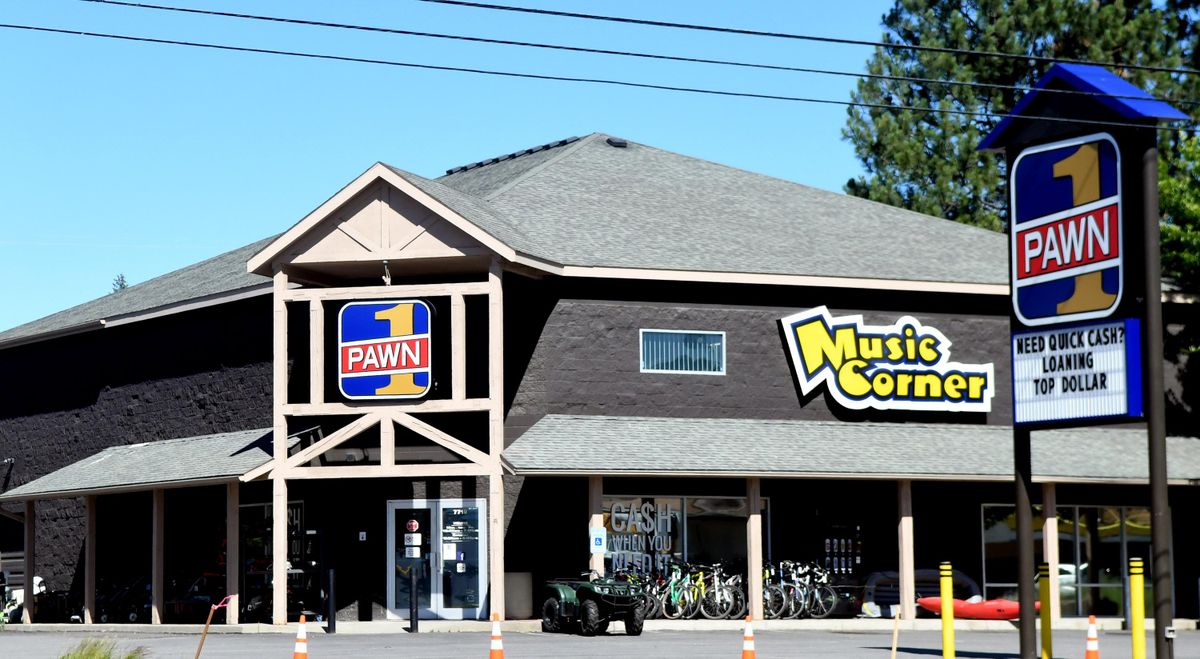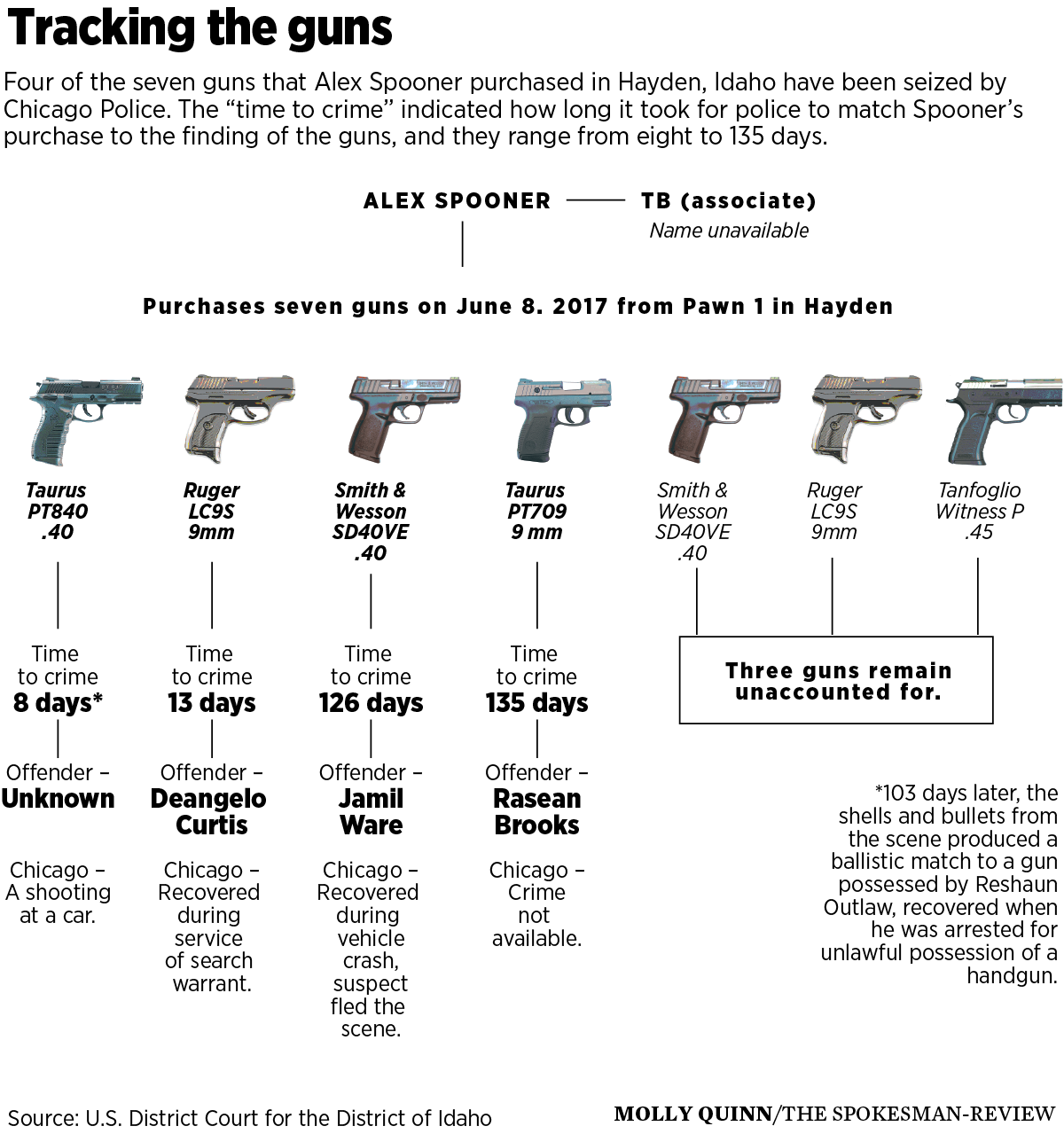Path of a gun: Weapon used in Chicago shooting traced back to Hayden pawn shop
The Pawn 1 in Hayden as seen on Tuesday, June 26, 2018. (Kathy Plonka / The Spokesman-Review)Buy a print of this photo
On June 8, 2017, a man named Alex Spooner walked into a pawn shop in Hayden, Idaho. He looked at some of the shop’s pistols, which were kept in a glass case.
Eight days later, one of those guns was used in a shooting in Chicago.
Spooner’s story illustrates how, at alarming speed, guns can move into the black market, over state borders, into the hands of felons and be used to commit crimes. And though it wasn’t Spooner who shot the gun, that didn’t stop him from landing in federal prison.
Spooner wasn’t alone when he entered the pawn shop that day. He was accompanied by a convicted felon, a person only referenced as T.B. in court documents.
The duo left the Pawn 1 shop empty handed, but Spooner returned a short time later. Spooner, a 23-year-old from Coeur d’Alene, had no criminal record. He told the clerk that he wanted to buy seven of the shop’s pistols, and the clerk handed him some paperwork to ensure he was legally able to buy them.
Part of that document was a Firearm Transaction Record from the Bureau of Alcohol, Tobacco, Firearms and Explosives. Question 11a on the form reads, “Are you the actual transferee/buyer of the firearm(s) listed on this form?” Following the question is a statement in bold: “Warning: You are not the actual transferee/buyer if you are acquiring the firearm(s) on behalf of another person.”
Spooner marked “Yes.”
He passed the background check, but by marking that box, he had lied to the federal government, which he later admitted to ATF agents.
From Brazil to Chicago
The guns swapped hands multiple times and crossed state borders following Spooner’s purchases. Eventually, they found their way into the hands of several convicted felons. Buying guns for convicted felons, who are not allowed to possess firearms, is a federal crime called a “straw purchase.”
One of the guns that Spooner bought was a Taurus .40-caliber semi-automatic pistol.
The gun was manufactured in a Taurus factory in São Leopoldo in southern Brazil. The next recorded transaction involving the gun shows it in Hayden when it was purchased by Spooner.
After Spooner bought it, he drove to North Dakota to meet the person identified in court records as T.B. T.B. gave Spooner “a couple hundred dollars and a few grams of heroin,” according to court documents.
The two parted company and T.B. headed east, taking the guns to Chicago.
The Taurus was used in a shooting in Chicago on June 16, 2017, just eight days after Spooner’s purchase. Chicago police found shell casings and bullet holes in an 2007 Toyota FJ Cruiser. No one was injured.
On Sept. 27, Chicago police arrested Reshaun Outlaw on charges of weapons violation and interference with a public officer. Outlaw had a Taurus .40 in his possession, and tests determined that the gun was the one used in the shooting in June 2017.
ATF agents then matched it to Spooner’s purchase in Idaho at Pawn 1 through the gun’s serial number, which was stored in an ATF database.
Court documents say the clerk at Pawn 1 remembered the sale to Spooner: “The employee recalled Spooner and his friend looked at the firearms and then left. Spooner returned a short time later and purchased the firearms with cash.”
David Chipman, a retired ATF agent who now works as a senior policy adviser at the Giffords Law Center for Preventing Gun Violence, said it’s these suspicious behaviors – similar to sketchy behavior when people buy alcohol for minors – that should raise a red flag to gun sellers and motivate them to contact the ATF.
Behaviors include ignorance about the guns they are buying, buying multiple guns at a time and talking on the phone immediately after looking at the guns, he said.
Pawn 1 did not respond to multiple requests for comment.
A funnel to the black market
In a federal court in Idaho on June 19, Spooner pleaded guilty to lying to a federally licensed firearm dealer. He is now in a federal prison in Seattle serving a 15-month sentence.
“This is one of the main criminal strategies for getting new guns trafficked,” Chipman said.
Chipman referenced an ATF study from 2000 of 1,530 gun trafficking cases. It determined that straw purchasers accounted for 46 percent of them. Chipman said the study is dated, but is the most recent available.
The most significant gun trafficking cases that Chipman saw during his time as an ATF agent involved gun dealers “who did the right thing,” he said. “They saw something that made them feel uneasy and they called ATF, and we worked together to get to the truth.”
Chipman said that “T.B.” is most likely being kept anonymous because the ATF could be trying to bust a bigger crime ring through him or her.
“That middle person is key,” he said. “Maybe (T.B.)’s flipping on the larger game in Chicago.
“There’s also the possibility that this guy didn’t know who he was dealing with.”
Chipman said women are often caught as straw purchasers because they can be forced into it.
“Just imagine you’re trying to do a boyfriend a favor or you have a drug addiction,” he said.
The exact path of the seven guns that T.B. got from Spooner is unknown. Besides the Taurus .40, three of the other guns have been found in nonviolent crimes: one in a search warrant sweep of a house, one in a car accident in which the suspect fled the scene, and another, which isn’t detailed in records. All were found in Chicago.
The other three guns are still missing.
Officer Michael Carroll, spokesman for the Chicago Police Department, said that if comprehensive background checks are to become more commonplace in general gun sales, then straw purchases will become more common, too.
That’s because it’s easy to get a gun without a background check or a straw purchaser, he said. Most gun purchases without background checks are done through private sellers found through websites like armslist.com, he said.
“It allows (potential buyers) to filter with private sellers,” he said. “Then (armslist.com) knows all the guns you can buy in a parking lot without a background check.”

